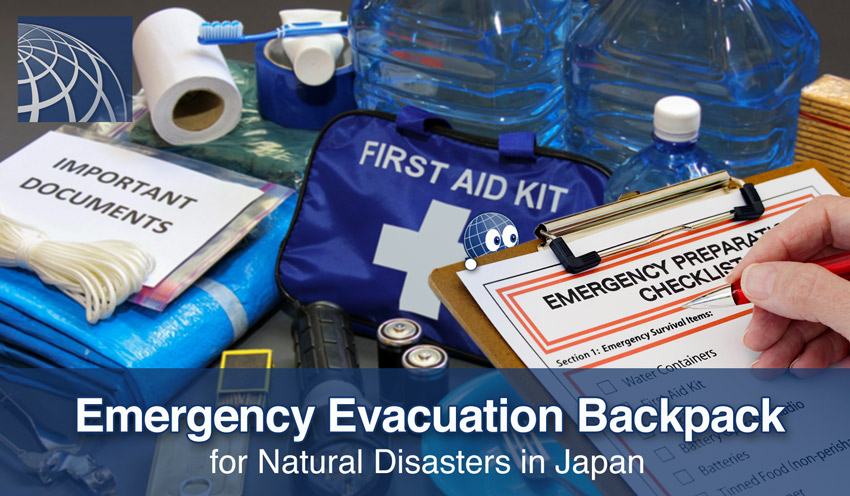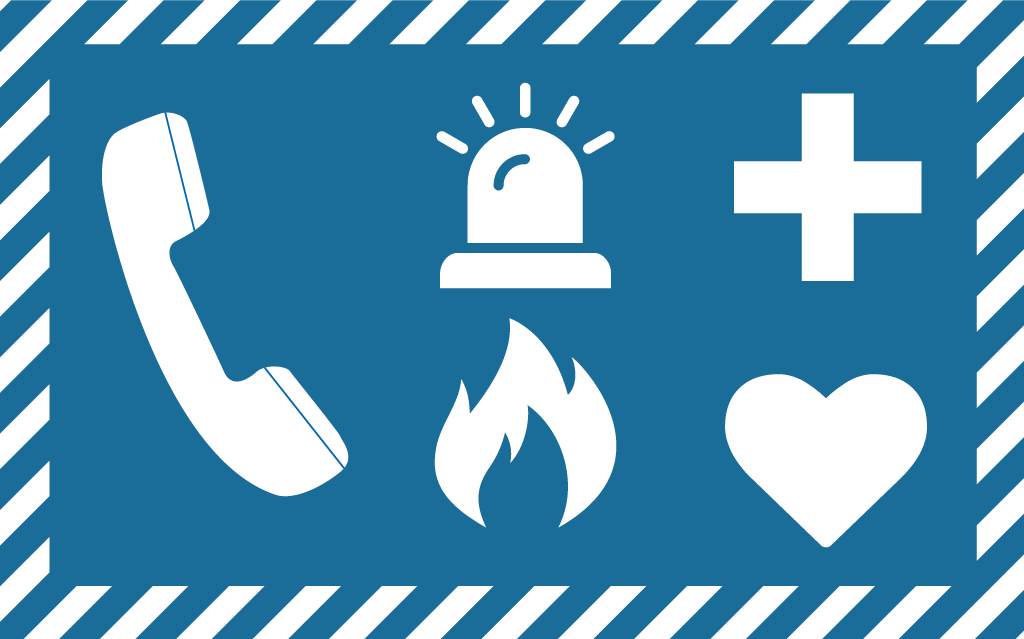Emergency Evacuation Backpack for Natural Disasters in Japan

Being prepared for emergency evacuation
It is advisable to have an evacuation bag prepared in the event of an emergency evacuation in Japan due to an earthquake, fire, tsunami, lifeline cutoff, etc.
What items are needed for you or your family to survive while waiting to be rescued or for food supplies to arrive if your home becomes no longer livable?
In this short guide we will give you some overall suggestions as to what you might want to pack so that you can be prepared.
We would like to also mention that your choice of items for your emergency evacuation kit might change depending on your surroundings (city, country side, mountains or ocean side.) Any links to any items are only examples of what you could use and are not endorsed by PLAZA HOMES LTD. in anyway. This is not a comprehensive list, only a general guide for assembling a basic emergency bag.
Disaster Preparedness: Stockpiling and Emergency Food in Japan >>
Backpack
This first thing you will need for your kit will be a backpack. We suggest one that is not only lightweight, but possibly waterproof and has many pockets that will help you organize your kit. Multi compartment bags such as the one pictured below are are good for organizing your supplies. For those with more supplies a hiking backpack might be better option.
One thing often overlooked when preparing an emergency kit, or packing a backpack in general, will be the distribution of the contents inside your backpack. It is recommended that you place the heavier items near the back of the backpack (the part closest to you when you are wearing it). This will make the backpack easier to carry and put less strain on you as well.
Clothing
Pack enough clothes to have at least one full change of clothes (socks, underwear, shirt and pants.)
Food
Pack dry food with a long shelf life such as instant ramen, dehydrated food, canned foods, or snacks (that also have a long shelf life). If the aforementioned items prove to be too bulky and difficult to carry, an alternative would be energy bars such as Calorie Mate (easy to find at stores) or possibly Datrex Food Bars (used by the military for survival situations.)
Water
Of all the items on this list, water is one of the most important items on this list. It is often said in an emergency survival situation that finding fresh drinking water first, is of the utmost importance. For your emergency bag, it is recommended that you have at up to 1 gallon of drinking water per person. If there is more than one person you may need to prepare for, more than one bag might be necessary due to the space needed.
Foldable water bags can be also very useful
Tools
You may or may not need any tools, but it is best to be prepared. The minimal suggested tools would be a multitool (Swiss army knife /leatherman), work gloves, a lighter, duct tape and a flashlight (solar powered or crank). Another quite important item is a whistle, which can be used to alert others of your location or call attention to yourself in the event you are hurt and are unable to move.
In this day and age having a charger for your phone is very important. Packing extra cords and a solar power charger or a power bank will make staying in contact and getting emergency help all the easier.
First Aid kit
Just as important as the rest of the items in this packing list, if not more, is the First Aid Kit. While it would be easier to purchase one of the pre-made kits available online, you can make your own. For the most basic First Aid Kit you will need; Band-Aids, disinfectant, over the counter medicines (aspirin/ibuprofen, anti-fungal cream, cough medicine), masks, and prescription medicine.
Sanitation
Nature will call and when it does, it is best to be prepared. Packing some toilet paper as well as some trash bags will make your life easier in a stressful situation. An alternative to packing a trash bag, is buying a portable toilet. A good idea is to remove the cardboard center from the toilet paper allowing you to compress it. Another suggestion is to keep the toilet paper in a water proof container so that it can avoid getting wet.
Also packing antibacterial wet tissues will make washing a bit easier if there is no water around. If you prepare portable compressed towels, they do not take up too much space either. In the even that you need to wash your hair, waterless shampoo is recommended as well.
Face Masks
It’s best to always have some masks in case of an emergency as well (such as during the COVID-19 pandemic). You may need a mask to either protect yourself from getting sick from others, or if you have hay fever help you survive seasons when there is a lot of pollen in the air. Keep in mind that in the event of a natural disaster or pandemic, masks may become sold out very quick so be sure to have some spares.
Shelter
For shelter and warmth, we recommended packing a lightweight blanket, a tent, a jacket and some pocket warmers.
Emergency Kit
Emergency Kits are very useful to stock at home. There are many varieties of types. Please choose one(s) which suit(s) you and your family.
Documents and Money
In the event of an emergency there may be quite a bit of confusion and there might also be times when you need identification. It is highly recommended to prepare copies (photocopies) of all of your important documents (passport, gaijin card, my number, proof of residence.. ect.) Keep these documents in a ziplock bag or another type of water proof container.
It is very likely that you will be unable to access your accounts at an ATM or other location during an emergency. It is highly recommended that you have emergency cash prepared as well. The amount recommended would vary greatly depending on the person, but anywhere from at least 10,000 to 100,000yen should be adequate.
** Other things to consider **
If you have pets consider packing some pet food and a toy or two, as well as a leash.
If you have children with you, pack some toys and books to keep them entertained and calm during a stressful emergency.
If you wear glasses, consider packing an extra pair in your emergency bag
Pack a book to read to give yourself a mental break from your stressful situation

- Rental Apartments & Houses in Tokyo
- Listings of popular and luxurious rental apartments, condominiums, and houses designed with expats in mind.

- Apartments & Houses for Sale in Tokyo
- Listings of apartments, condominiums, and houses available for purchase in Tokyo.















































